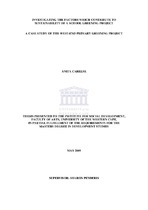| dc.description.abstract | West-End Primary is one of more than 100 public schools in South Africa, which since 1994, has greened large parts of its school grounds with a water-wise indigenous and vegetable garden. The South African National Botanical Institute-Environmental Education Unit (SANBI-EEU) is a government agency that has undertaken responsibility for implementing greening projects in partnership with public schools such as West-End Primary. SANBI-EEU encourages and supports the establishment of indigenous and vegetable gardens to facilitate teaching, to support school nutrition programmes and to make possible the employment of unemployed community members.Anecdotal evidence points to local cases where the “caretaker inherits” the greening project because other stakeholders (educators, learners) no longer participate in garden maintenance or because projects are started but cannot be sustained. The
review of theory suggests that project sustainability is achieved and ensured through adopting a people-centred, participatory and sustainable approach to development.Hence, participation, capacity and capacity building is important to ensure this.Incorporating these development approaches into programme, project and operations management strengthens the process for achieving and ensuring project sustainability.
This study was exploratory and used an empirical research design which combined qualitative and quantitative methods to investigate sustainability factors. The research population comprised Grade 5, 6 and 7 learners, staff and parents/community members at the West-End Primary School.In general the research findings demonstrated that West-End Primary achieved a degree of sustainability after project implementation. The study found that developmental factors such as participation, capacity, capacity building did in part contribute to achieving and ensuring this degree of sustainability. However a year and several months after project implementation, the degree of sustainability achieved was in a fragile state. This fragility was the result of a mix of weakness and strengths in
the factors that have contributed to sustaining the greening project. | en_US |

